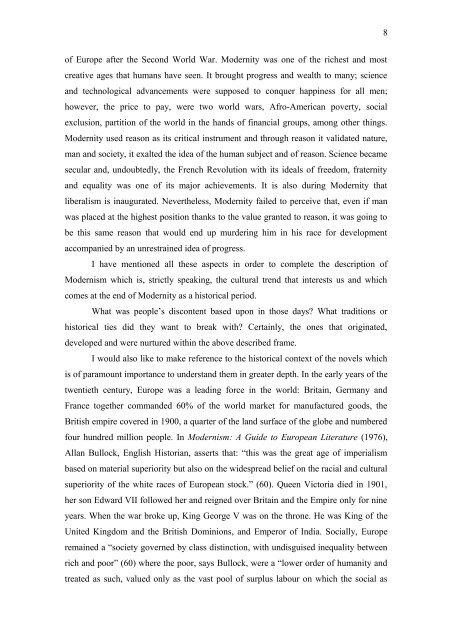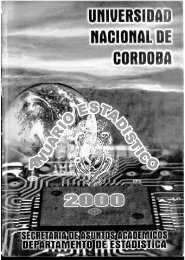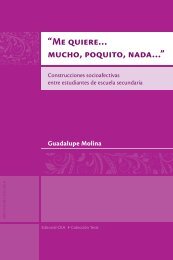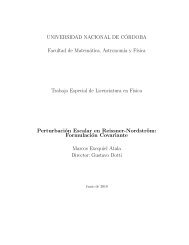8of Europe after the Second World War. Mo<strong>de</strong>rnity was one of the richest and mostcreative ages that humans have seen. It brought progress and wealth to many; scienceand technological advancements were supposed to conquer happiness for all men;however, the price to pay, were two world wars, Afro-American poverty, socialexclusion, partition of the world in the hands of financial groups, among other things.Mo<strong>de</strong>rnity used reason as its critical instrument and through reason it validated nature,man and society, it exalted the i<strong>de</strong>a of the human subject and of reason. Science becamesecular and, undoubtedly, the French Revolution with its i<strong>de</strong>als of freedom, fraternityand equality was one of its major achievements. It is also during Mo<strong>de</strong>rnity thatliberalism is inaugurated. Nevertheless, Mo<strong>de</strong>rnity failed to perceive that, even if manwas placed at the highest position thanks to the value granted to reason, it was going tobe this same reason that would end up mur<strong>de</strong>ring him in his race for <strong>de</strong>velopmentaccompanied by an unrestrained i<strong>de</strong>a of progress.I have mentioned all these aspects in or<strong>de</strong>r to complete the <strong>de</strong>scription ofMo<strong>de</strong>rnism which is, strictly speaking, the cultural trend that interests us and whichcomes at the end of Mo<strong>de</strong>rnity as a historical period.What was people’s discontent based upon in those days? What traditions orhistorical ties did they want to break with? Certainly, the ones that originated,<strong>de</strong>veloped and were nurtured within the above <strong>de</strong>scribed frame.I would also like to make reference to the historical context of the novels whichis of paramount importance to un<strong>de</strong>rstand them in greater <strong>de</strong>pth. In the early years of thetwentieth century, Europe was a leading force in the world: Britain, Germany andFrance together comman<strong>de</strong>d 60% of the world market for manufactured goods, theBritish empire covered in 1900, a quarter of the land surface of the globe and numberedfour hundred million people. In Mo<strong>de</strong>rnism: A Gui<strong>de</strong> to European Literature (1976),Allan Bullock, English Historian, asserts that: “this was the great age of imperialismbased on material superiority but also on the wi<strong>de</strong>spread belief on the racial and culturalsuperiority of the white races of European stock.” (60). Queen Victoria died in 1901,her son Edward VII followed her and reigned over Britain and the Empire only for nineyears. When the war broke up, King George V was on the throne. He was King of theUnited Kingdom and the British Dominions, and Emperor of India. Socially, Europeremained a “society governed by class distinction, with undisguised inequality betweenrich and poor” (60) where the poor, says Bullock, were a “lower or<strong>de</strong>r of humanity andtreated as such, valued only as the vast pool of surplus labour on which the social as
9well as the economic system <strong>de</strong>pen<strong>de</strong>d.” (61) Also, in the economic arena, the halfcentury before the war was the most remarkable period of growth in history notexcluding our own time: technological <strong>de</strong>velopments such as the telephone, the internalcombustion engine, the aeroplane, synthetic materials produced by the chemicalindustry, etc. remain the foundations of the technology of the XXth century. Regardingall these advancements, Bullock raises an interesting point when he says that in 1914“the threat of war didn’t evoke any horror because people were not aware or had anyi<strong>de</strong>a of what mo<strong>de</strong>rn technological war would mean not only for individuals but forsocieties.” Therefore: “When the crowds cheered the <strong>de</strong>claration of war in everyEuropean capital, did so not out of some collective urge, but out of ignorance.” (62)This was the age that saw women vote for the first time, the rise of socialism,comunism, the Labour Party and Irish Republicanism and the coming into office in1924 of the first Labour Prime Minister, Ramsay MacDonald, all of which radicallychanged the political spectrum.Although a lot of aspects of communal life were not the best and there was an“open, uninhibited acceptance of inequality, power and wealth, class or racialsuperiority”, Bullock insists that this was an age “remarkably unselfconscious, selfconfi<strong>de</strong>nt, far less troubled by the anxieties, fears and guilt which (...) have found such avivid expression and subscription in Europe since then.” (64). Sigmund Freudreconfirms this i<strong>de</strong>a of self confi<strong>de</strong>nce when he <strong>de</strong>scribes the way Europeans sawthemselves as nations then: “...the great white race nations, masters of the world, towhich the direction of humanity has been granted, which have been the safeguards ofworld interests and to which are owed technological progress as well as the highestcultural, artistic and scientific values...” 3 (Consi<strong>de</strong>raciones <strong>de</strong> actualidad sobre laguerra y la muerte 3) He i<strong>de</strong>ntifies this spirit of confi<strong>de</strong>nce and self sufficiency aspertaining to all European countries those days but it slowly started to dissolve after twoworld wars and the Holocaust. In the same paragraph Freud argues that these nationswith so many virtues and strengths should have been able to solve their differences andtheir conflicts of interests without resorting to war. (cf. Consi<strong>de</strong>raciones <strong>de</strong> actualidadsobre la guerra y la muerte 3)Despite all this self confi<strong>de</strong>nce and apparent self sufficiency, Mo<strong>de</strong>rnism is also<strong>de</strong>scribed by theorists as a time that not only brought the expected revolution andchange of sensibility that every new generation brings, but it was “rather a break-up, a3My own translation
- Page 1 and 2: 1INTRODUCTION.Marcelo Figueras, Arg
- Page 3 and 4: 3CHAPTER 1. Theoretical considerati
- Page 5 and 6: 5Hassan continues saying that there
- Page 7: 7novels are then, the mise en scèn
- Page 11 and 12: 11The following lines from What The
- Page 13 and 14: 13between a television commercial a
- Page 15: 15Raja 95-97) 5 Within this logic,
- Page 18 and 19: 18apocalyptic rhetoric of a Charles
- Page 20 and 21: 20In her doctoral thesis, Dr. Crist
- Page 22 and 23: 22of knowledge that strives to beco
- Page 24 and 25: 24is general with what is particula
- Page 26 and 27: 26creative process, f) the novels a
- Page 28 and 29: 28“this is the most important cha
- Page 30 and 31: 30a vibration. It pushes against th
- Page 32 and 33: 32Odyssey would be for Joyce’s Ul
- Page 34 and 35: 34Still 22) Hypertextuality is a pr
- Page 36 and 37: 36qtd. in Allen 37) Here, Shelley t
- Page 38 and 39: 38decide whether they are examples
- Page 40 and 41: 40knowing subjects be it Barker or
- Page 42 and 43: 42him back to war, as “the Saviou
- Page 44 and 45: 44was the step daughter of a man wh
- Page 46 and 47: 46happened as it did. It was a prob
- Page 48 and 49: 48If you are creating you have hope
- Page 50 and 51: 50of nervous unbalance for which he
- Page 52 and 53: 52context of Barker’s novels. If
- Page 54 and 55: 54there at all. Burns, one of River
- Page 56 and 57: 56stock to the Army. Billy felt his
- Page 58 and 59:
58man who did not quite fit with hi
- Page 60 and 61:
60negative viewpoint about war. In
- Page 62 and 63:
62CHAPTER 3. The broken hero3.1 Bil
- Page 64 and 65:
64Then, in 1914, the war broke out
- Page 66 and 67:
66says Dr. Yealland, another real c
- Page 68 and 69:
68seem to be sufficient or strong e
- Page 70 and 71:
70we are gone they’ll lie about i
- Page 72 and 73:
72behaviour and even psychology, ve
- Page 74 and 75:
74‘What did you do before the war
- Page 76 and 77:
76private soldiers and not officers
- Page 78 and 79:
78Perhaps because he’d recently b
- Page 80 and 81:
80initially believed that the diffe
- Page 82 and 83:
82values and the disappearance of a
- Page 84 and 85:
84resentment. On one occasion when
- Page 86 and 87:
86‘I love you Sarah Lumb.’‘I
- Page 88 and 89:
88In order to do this analysis, let
- Page 90 and 91:
90Soldiers and officers were made t
- Page 92 and 93:
92Spiegel: So there is no such thin
- Page 94 and 95:
94these motives clashed with other
- Page 96 and 97:
96Let us go back to Prior now. I wi
- Page 98 and 99:
98part of life which has to be reco
- Page 100 and 101:
100problematic and multifaceted cha
- Page 102 and 103:
102Nothing stopped him from humilia
- Page 104 and 105:
104chooses the victim’s side and
- Page 106 and 107:
106incompetence of officers, the di
- Page 108 and 109:
108Modernism, (...) particularly it
- Page 110 and 111:
110intellectual honesty to be able
- Page 112 and 113:
112history is a continuum of which
- Page 114 and 115:
114Amorós, Andrés. Introducción
- Page 116 and 117:
116Grützmacher, Lukasz. “Las tra
- Page 118:
118Spargo, Tamsin (ed). Reading the
















